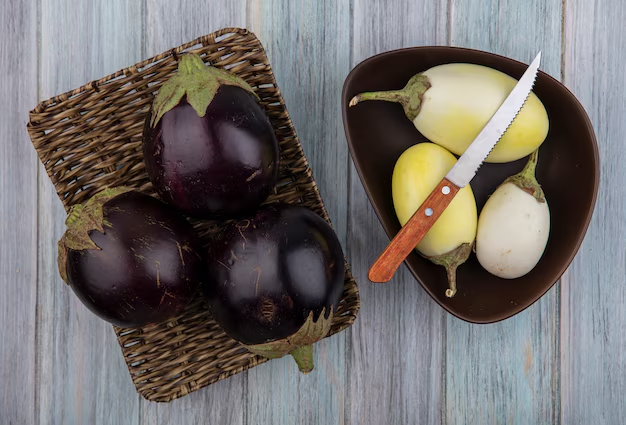Should You Really Keep Eggplant in the Refrigerator? Here's What You Need to Know
Have you ever stored an eggplant in your refrigerator only to find its skin wrinkled and its texture a bit off when you finally took it out to cook? If that sounds familiar, you're not alone. The question of whether to store eggplant in the refrigerator or on the counter is a common kitchen conundrum that leaves many of us wondering about the best way to keep this versatile vegetable fresh. Let’s explore the best practices for storing eggplant and why your refrigerator might not be the ideal home for it.
Understanding Eggplant: What Makes It Unique?
Before diving into storage techniques, it's crucial to understand what eggplant is and its characteristics. Often referred to as aubergine in some parts of the world, eggplant is technically a fruit but is commonly cooked as a vegetable. They come in various shapes, sizes, and colors, most commonly recognized by their glossy, deep purple skin.
Eggplants belong to the nightshade family, alongside tomatoes and potatoes. This group of plants has specific storage requirements due to their delicate composition. Notably, eggplants are sensitive to temperature changes, which greatly affects their texture and longevity.
Factors Influencing Eggplant Storage
Temperature Sensitivity
Eggplants prefer a cool, yet not-too-cold environment. Temperature extremes can harm their integrity and flavor:
Cold Damage: Eggplants are vulnerable to chilling injury below 50°F (10°C). This condition results in pitting, browning, and a general decline in quality. Such damage typically manifests as a watery texture when cooked, losing its appeal entirely.
Heat Issues: Conversely, eggplant exposed to high temperatures (over 77°F or 25°C) for extended periods may become overly soft or even spoil.
Ethylene Sensitivity
Much like other members of the nightshade family, eggplants are sensitive to ethylene gas—a natural plant hormone affecting ripening. When eggplants are stored near ethylene-producing fruits like bananas or apples, they may ripen and spoil faster.
To Refrigerate or Not? Analyzing Both Options
Storing Eggplant at Room Temperature
Pros:
- Maintains Texture: Keeping eggplants on the counter helps preserve their firm texture and vibrant flavor.
- Longevity: Properly stored at temperatures around 50°F-54°F (10°C-12°C), eggplants can remain fresh for several days.
- Convenience: Easy access when cooking.
Cons:
- Spoilage Risk: Without temperature regulation, room temperature might hasten spoilage in warmer climates.
Storing Eggplant in the Refrigerator
Pros:
- Extended Lifespan: Under controlled conditions, refrigeration might prolong the eggplant's shelf life slightly but only for around 4-5 days.
Cons:
- Chilling Injury: Eggplants often suffer from cold damage, as many refrigerators are set colder than optimal conditions, leading to moisture loss and poor texture.
- Flavor Compromise: Cold alters taste, sometimes resulting in a bland or bitter outcome.
Practical Tips for Eggplant Storage
Here are some tips to ensure your eggplants remain fresh and delicious:
🌡️ Temperature Control
- Ideal Spot: If possible, aim for a storage area between 50°F-54°F (10°C-12°C). A cool pantry or basement shelf could be more suitable than the fridge.
🛠️ Storage Techniques
On the Counter:
- Store in a cool, dry place away from direct sunlight and ethylene-emitting produce.
- Keep eggplants in a breathable bag or loosely wrapped in a cloth to avoid condensation and moisture buildup.
In the Refrigerator:
- If you must refrigerate, use the crisper drawer where temperatures are a bit higher.
- Wrap the eggplant in a paper towel and place it in a perforated plastic bag to reduce humidity exposure while maintaining air circulation.
🕒 Freshness Monitoring
- Check your eggplants regularly for any signs of spoilage, such as soft spots or color changes, to ensure peak freshness.
🥘 Cooking Considerations
Eggplants should be used while they are firm and their skin is taut and shiny. Soft, leathery skin is a sign that the eggplant is aging and should be used quickly.
The Best Practices for Other Vegetables
Understanding how eggplants react to different storage conditions might prompt curiosity about other vegetables:
- Tomatoes: Like eggplants, these should ideally be stored at room temperature to maintain flavor and texture.
- Bell Peppers: Can be refrigerated but do best in the crisper drawer to avoid becoming slimy.
- Root Vegetables: Prefer a cool, dark place to maintain their integrity.
A Summary of Key Takeaways
Here's a quick breakdown to simplify the decisions needed for storing your eggplants effectively:
- 💡 Ideal Storage Temperature: 50°F-54°F (10°C-12°C)
- 🚫 Refrigeration Risk: Chilling injury leads to texture loss.
- 🍎 Avoid Ethylene Producers: Keep away from apples, bananas, and other ethylene-producing produce.
- 🛡️ Protection Method: Use breathable bags or cloth wraps for counter storage.
- 🧊 Refrigerator Tips: If necessary, store in crisper in a perforated bag.
Eggplants, with their shiny appearance and versatile flavor, deserve the best storage practices to maintain their appeal. By understanding the intricacies of what makes this plant particular, you can ensure that every eggplant you buy will enhance your culinary endeavors rather than detract from them. Happy cooking, and may your eggplants always be delicious!

